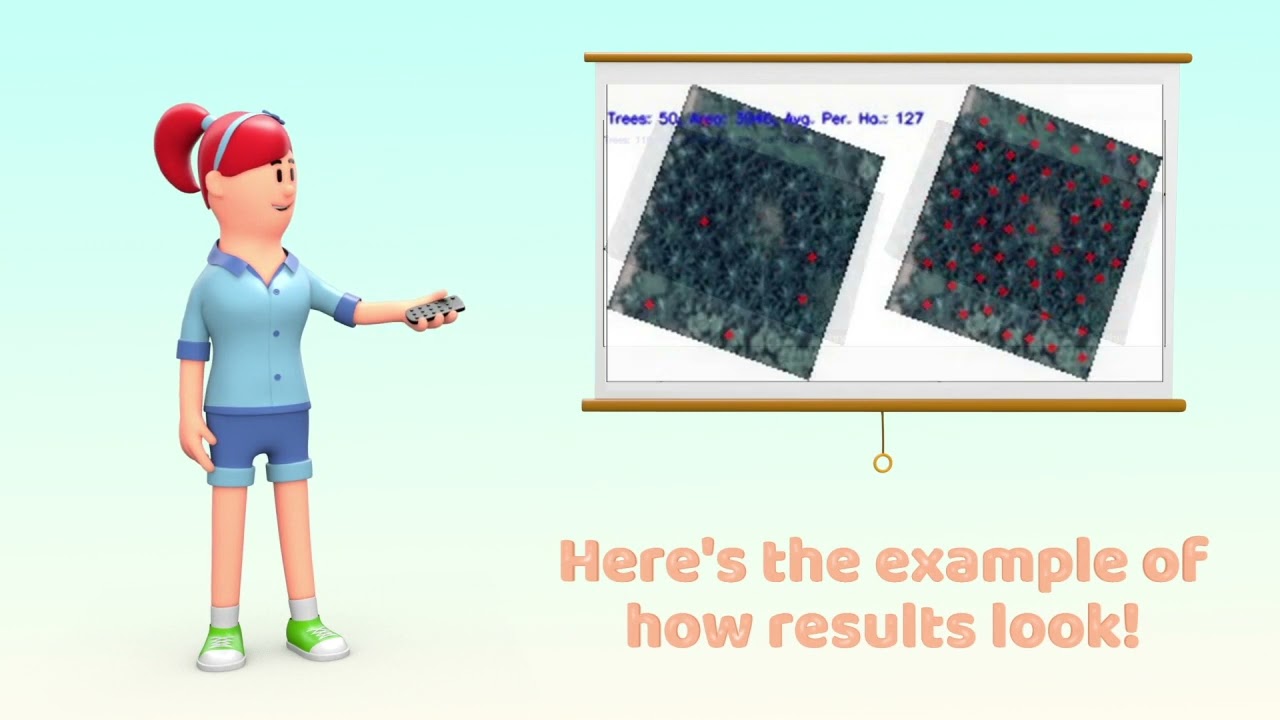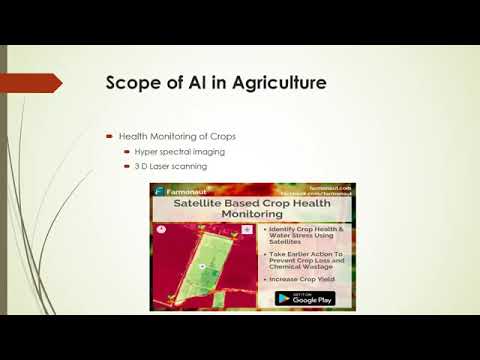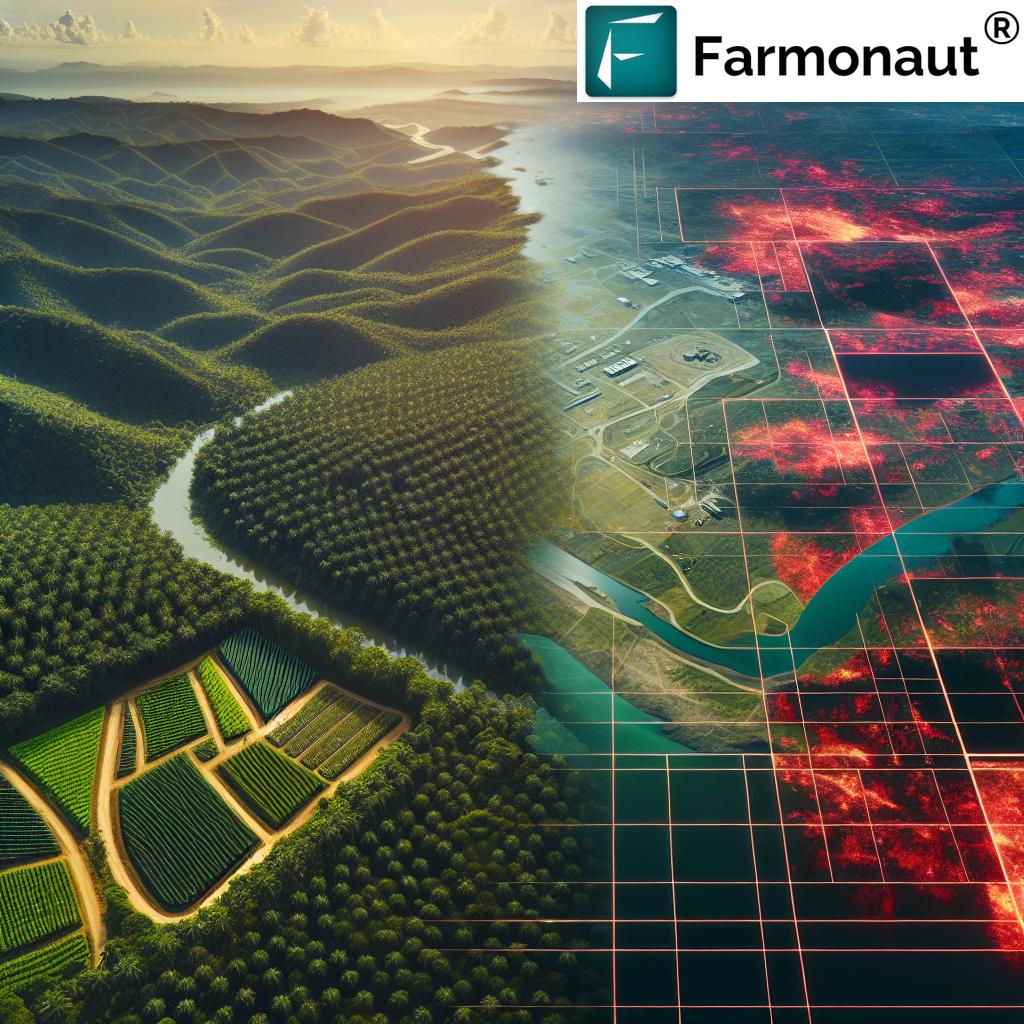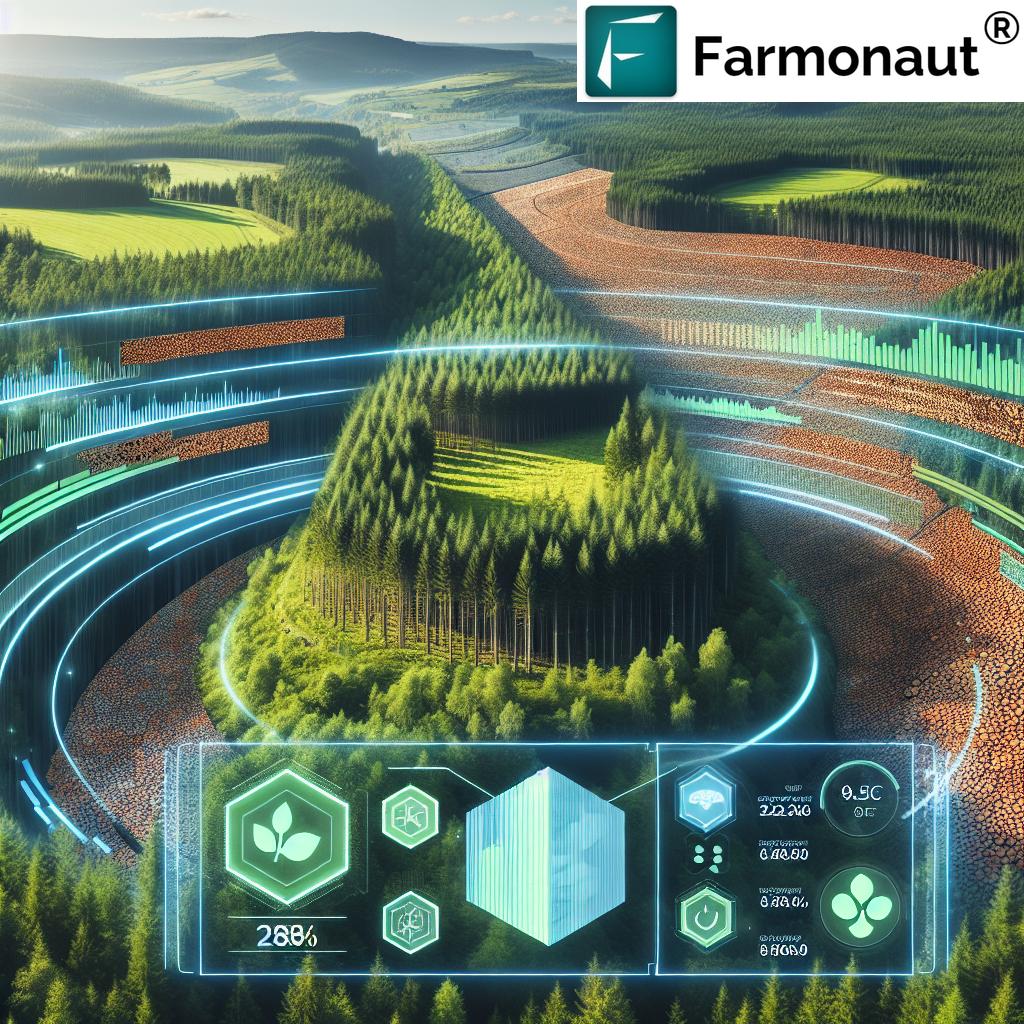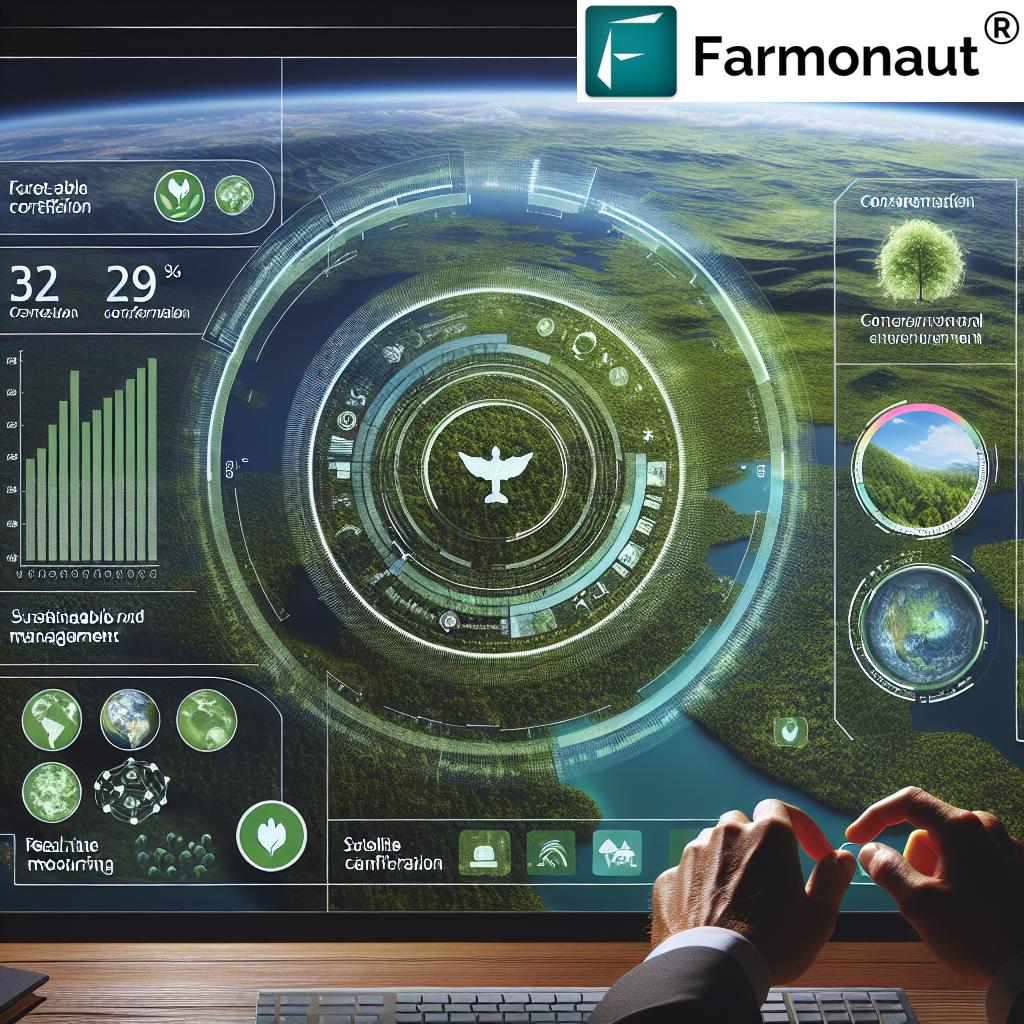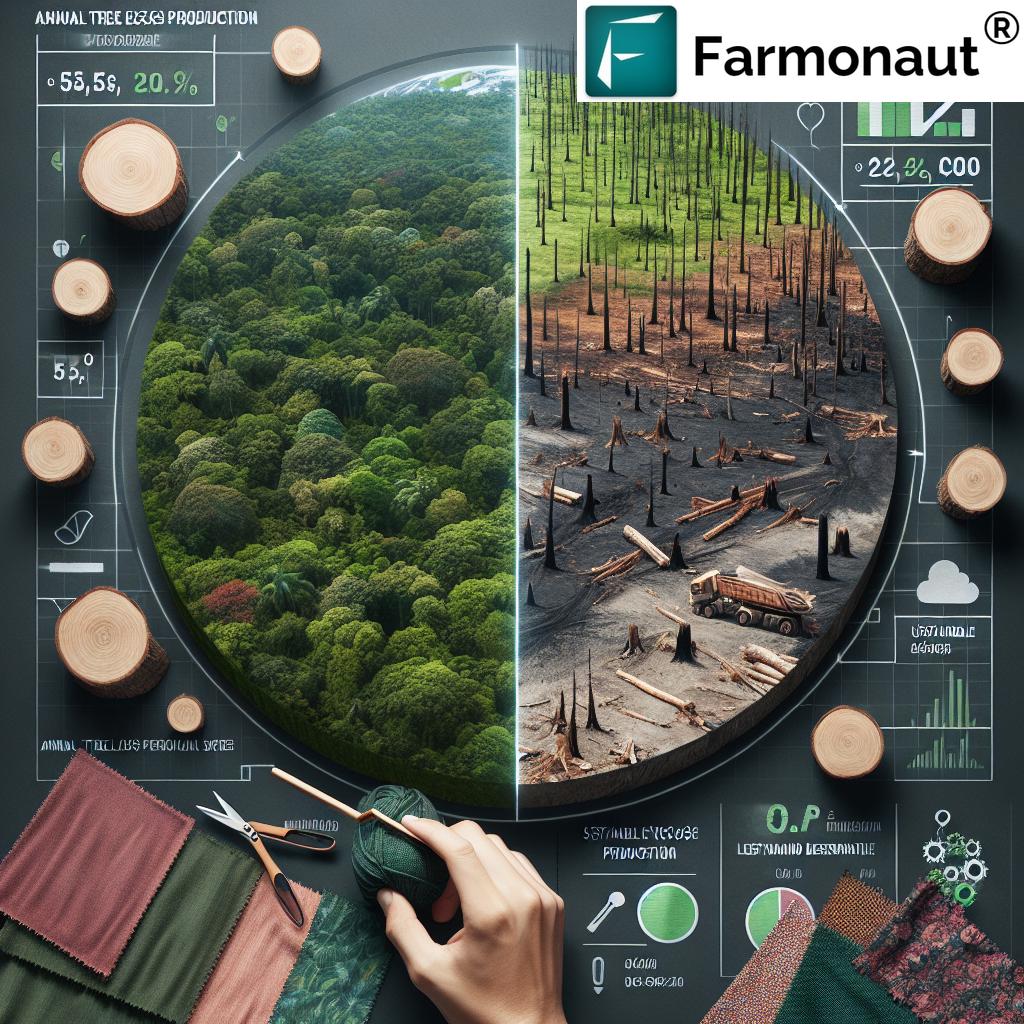EU Deforestation Regulation: Urgent Call for Peatland Protection in Indonesia’s Palm Oil Industry
“Only 50% of palm oil producers have implemented peatland protection policies, despite urgent environmental concerns.”
At Farmonaut, we understand the critical importance of sustainable agricultural practices and their impact on global climate efforts. Today, we’re taking a deep dive into a pressing issue that’s making waves in the agricultural world: the EU Deforestation Regulation (EUDR) and its implications for peatland protection in Southeast Asia, particularly in Indonesia’s palm oil industry.

As we navigate through this complex landscape, we’ll explore the alarming carbon emissions from peatland destruction, the mixed commitments from palm oil producers, and the urgent need for climate change mitigation in agriculture. Our goal is to provide you with valuable insights on sustainable palm oil production strategies, agricultural fire prevention techniques, and the crucial importance of peatland conservation.
The Southeast Asian Haze Crisis: A Wake-Up Call
The Southeast Asian region is currently grappling with a severe haze crisis, fueled by widespread fires that are ravaging forests and peatlands. This environmental disaster is not just a local issue; it has far-reaching consequences for global climate change and public health.
- Peatland fires release massive amounts of carbon dioxide into the atmosphere
- The resulting smog affects millions of people across multiple countries
- Economic losses from the haze crisis are estimated in billions of dollars
The situation is particularly dire in Indonesia, where vast areas of peatlands have been drained and cleared for palm oil plantations. These practices have made the land highly susceptible to fires, especially during dry seasons exacerbated by El Niño events.
The EU Deforestation Regulation: A Game-Changer for Palm Oil Sustainability
In response to the global deforestation crisis, the European Union has introduced the EU Deforestation Regulation (EUDR). This landmark legislation aims to ensure that products sold in the EU market are not linked to deforestation or forest degradation.
Key points of the EUDR include:
- Mandatory due diligence for companies importing palm oil and other commodities
- Strict traceability requirements for supply chains
- Penalties for non-compliance, including fines and market exclusion
For the palm oil industry, particularly in Indonesia, this regulation presents both challenges and opportunities. It’s a clear signal that business-as-usual is no longer acceptable, and a transition to sustainable practices is not just desirable but essential.
Peatland Protection: A Critical Component of Sustainable Palm Oil Production
Peatlands are not just another type of soil; they are critical carbon sinks that play a vital role in regulating our planet’s climate. When drained and burned, these ecosystems release enormous amounts of greenhouse gases, contributing significantly to global warming.
“Peatland destruction in Southeast Asia contributes significantly to carbon emissions, exacerbating the region’s severe haze crisis.”
Our analysis at Farmonaut reveals a concerning trend:
- Only 50% of palm oil producers have implemented peatland protection policies
- Carbon emissions from peatland destruction in Southeast Asia are alarmingly high
- The lack of comprehensive protection strategies poses a significant risk to global climate efforts
This data underscores the urgent need for action in the palm oil industry. The EUDR’s implementation timeline is rapidly approaching, and producers must act swiftly to ensure compliance and contribute to deforestation-free supply chains.
Sustainable Palm Oil Production Strategies
At Farmonaut, we believe that technology plays a crucial role in promoting sustainable agricultural practices. Our satellite-based farm management solutions offer valuable tools for palm oil producers looking to improve their sustainability credentials:
- Real-time crop health monitoring to optimize resource use
- AI-driven advisory systems for better decision-making
- Blockchain-based traceability for transparent supply chains
Explore our solutions: Farmonaut Web App

These tools can help palm oil producers transition to more sustainable practices, reducing their environmental impact while improving productivity and compliance with regulations like the EUDR.
Agricultural Fire Prevention: A Key to Protecting Peatlands
One of the most pressing issues in palm oil production is the use of fire for land clearance. This practice, known as slash-and-burn, is a major contributor to the haze crisis and peatland destruction. Implementing effective fire prevention strategies is crucial for protecting these valuable habitats and ensuring compliance with the EUDR.
Key fire prevention techniques include:
- Improved water management in peatland areas
- Use of mechanical clearing methods instead of burning
- Implementation of early warning systems for fire detection
- Community engagement and education on fire risks
By adopting these practices, palm oil producers can significantly reduce the risk of fires and demonstrate their commitment to sustainable production methods.
Climate Change Mitigation in Agriculture: The Role of Peatland Conservation
Peatland conservation is not just about protecting biodiversity; it’s a critical component of global climate change mitigation efforts. These ecosystems store vast amounts of carbon, and their preservation is essential for meeting international climate goals.
Conservation strategies that palm oil producers can implement include:
- Rewetting drained peatlands to restore their natural hydrology
- Implementing agroforestry systems that maintain peat soil integrity
- Investing in research and development for peatland-friendly cultivation techniques
At Farmonaut, we’re committed to supporting these efforts through our advanced agricultural technology solutions. Our satellite-based monitoring can help track the health of peatland ecosystems and provide valuable data for conservation initiatives.
For developers interested in integrating our technology: Farmonaut API | API Developer Docs
The EUDR Implementation Timeline: What Palm Oil Producers Need to Know
The EUDR is set to come into force soon, and palm oil producers need to be prepared. Here’s a brief overview of the key dates and requirements:
- December 2024: EUDR comes into effect
- June 2025: Large operators must comply with due diligence requirements
- December 2025: Micro and small enterprises must comply
To ensure compliance, producers should:
- Conduct thorough supply chain assessments
- Implement robust traceability systems
- Develop and enforce strict no-deforestation policies
- Invest in sustainable production technologies
Farmonaut’s solutions can assist producers in meeting these requirements by providing accurate, real-time data on land use and crop health.

Assessing Progress: A Look at Palm Oil Producer Commitments
Our analysis of the palm oil industry reveals a mixed picture when it comes to peatland protection commitments. While some producers have made significant strides, others lag behind. Here’s a breakdown of our findings:
| Country | Percentage of Producers with Peatland Protection Policies | Estimated Annual Carbon Emissions from Peatland Destruction (million tons CO2) | EUDR Compliance Readiness (1-5 scale)* |
|---|---|---|---|
| Indonesia | 50% | 500 | 3 |
| Malaysia | 65% | 200 | 4 |
| Thailand | 30% | 50 | 2 |
* EUDR Compliance Readiness Scale: 1 = Not prepared, 5 = Fully prepared
This data highlights the urgent need for increased commitment to peatland protection across the region. Producers who fail to act risk non-compliance with the EUDR and potential exclusion from the EU market.
The Path Forward: Investments and Risk Mitigation
For palm oil producers, the path to sustainability and EUDR compliance involves significant investments and risk mitigation strategies. Key areas for investment include:
- Advanced monitoring and traceability systems
- Sustainable land management practices
- Research and development in peatland-friendly cultivation techniques
- Community engagement and smallholder support programs
While these investments may seem daunting, they are essential for long-term business viability and environmental sustainability. Producers who take proactive steps now will be better positioned to thrive in an increasingly regulated market.
The Role of Technology in Sustainable Palm Oil Production
At Farmonaut, we believe that technology is a key enabler of sustainable agriculture. Our suite of tools can help palm oil producers meet the challenges of the EUDR and contribute to peatland protection:
- Satellite-based crop monitoring for optimal resource management
- AI-driven insights for precision agriculture
- Blockchain-based traceability for transparent supply chains
- Carbon footprint tracking for environmental impact assessment
By leveraging these technologies, producers can improve their sustainability performance, reduce risks, and demonstrate compliance with regulations like the EUDR.
Download our mobile apps for on-the-go farm management:


Global Implications: Beyond Southeast Asia
While our focus has been on Southeast Asia, particularly Indonesia, the issues of peatland protection and sustainable palm oil production have global implications. The EUDR sets a precedent that could influence regulations in other markets, potentially reshaping the global palm oil industry.
Key considerations for global stakeholders include:
- The potential for similar regulations in other major markets
- The role of international cooperation in addressing deforestation
- The impact on global supply chains and trade relationships
- The need for technology transfer and capacity building in developing countries
As we move forward, it’s clear that the palm oil industry must embrace sustainability not just as a compliance issue, but as a core business strategy.
Conclusion: A Call to Action for Sustainable Palm Oil
The EU Deforestation Regulation represents a critical juncture for the palm oil industry, particularly in Indonesia and Southeast Asia. It’s a clear signal that the global market is demanding sustainable, deforestation-free products. For palm oil producers, this presents both challenges and opportunities.
Key takeaways from our analysis:
- Peatland protection is essential for climate change mitigation and EUDR compliance
- Only 50% of producers have implemented peatland protection policies – urgent action is needed
- Sustainable production strategies, including fire prevention, are crucial for long-term viability
- Technology plays a vital role in enabling sustainable practices and ensuring compliance
- Investments in sustainability now will pay dividends in the future
At Farmonaut, we’re committed to supporting the agricultural industry’s transition to more sustainable practices. Our advanced satellite-based solutions provide the tools and insights needed to navigate this changing landscape successfully.
The time for action is now. By embracing sustainable practices, leveraging technology, and prioritizing peatland protection, the palm oil industry can meet the challenges of the EUDR and contribute to global climate change mitigation efforts. Together, we can create a more sustainable future for agriculture and our planet.
FAQ Section
Q: What is the EU Deforestation Regulation (EUDR)?
A: The EUDR is a legislation introduced by the European Union to ensure that products sold in the EU market are not linked to deforestation or forest degradation. It requires mandatory due diligence for companies importing commodities like palm oil and sets strict traceability requirements for supply chains.
Q: Why are peatlands important in the context of palm oil production?
A: Peatlands are critical carbon sinks that play a vital role in regulating our planet’s climate. When drained and burned for palm oil cultivation, these ecosystems release enormous amounts of greenhouse gases, contributing significantly to global warming and exacerbating the haze crisis in Southeast Asia.
Q: How can palm oil producers prepare for EUDR compliance?
A: Producers can prepare by conducting thorough supply chain assessments, implementing robust traceability systems, developing and enforcing strict no-deforestation policies, and investing in sustainable production technologies. Farmonaut’s satellite-based solutions can assist in meeting these requirements by providing accurate, real-time data on land use and crop health.
Q: What are some effective fire prevention techniques for palm oil plantations?
A: Key fire prevention techniques include improved water management in peatland areas, use of mechanical clearing methods instead of burning, implementation of early warning systems for fire detection, and community engagement and education on fire risks.
Q: How can technology contribute to sustainable palm oil production?
A: Technology plays a crucial role in enabling sustainable practices. Farmonaut’s solutions, for example, offer satellite-based crop monitoring for optimal resource management, AI-driven insights for precision agriculture, blockchain-based traceability for transparent supply chains, and carbon footprint tracking for environmental impact assessment.


